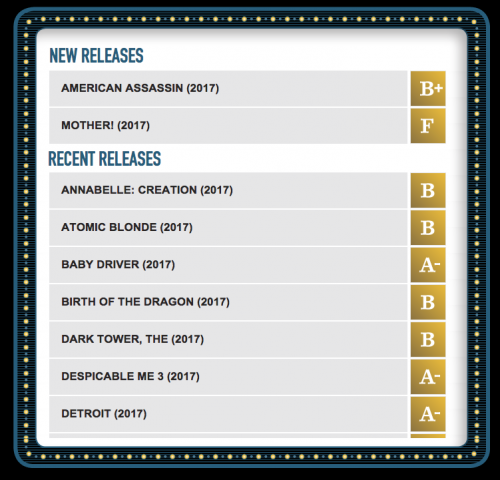The Real Measurement of Cinemascore, by Tyler Smith
Much has been made of the recent Cinemascore of Darren Aronofsky’s mother!, which received the rare “F”. Many see it as proof that the film is deeply flawed, if not downright awful. However, given that Cinemascore is a measure of audience reaction after the first weekend, and that, of the recent films, only mother! drops below a “C” rating, I feel like it is more a measurement of marketing than of actual quality.
I saw the film last night and, upon leaving, one of the ushers asked if I enjoyed the movie, following up with a question about the film’s scariness. I was a bit perplexed. It was certainly not scary. Disturbing, sure, but certainly not scary. I wondered why he would ask that.
But, of course, I hadn’t seen the trailer yet, which absolutely presents it as a much more conventional horror film, albeit one that might be more psychological in nature. At no point does it indicate at all the suspenseful allegory that mother! actually is. When comparing the marketing and the film itself, I really can’t blame any casual moviegoer for a frustrated reaction.
I find myself wondering why Paramount Pictures would have marketed the film in this way. I suppose that, with Jennifer Lawrence and a fairly well-known director involved, they assumed that they’d be able to drum up a solid box office, regardless of the film that was actually produced.
But, while opening weekend is still vital, word-of-mouth still plays a role, and the buzz around mother! – as a terrible horror movie at best and a complete con job at worst – caused viewer curiosity to drop off dramatically after the first couple of days, bringing the total box office to just over $7 million. Compare that to It, which in its second weekend made over $60 million, and you’ll start to understand the importance of semi-truthful advertising. For good or ill, people knew exactly what they were going to get when they saw It, and that’s what they got.
I understand that not every film lends itself to mass marketability, but a savvy studio would realize that they could always go the prestige route and advertise to a more specifically refined audience. Had Paramount realized that they could have marketed the film to the arthouse crowd as a sort of nightmarish answer to Terrence Malick, it might have been more successful. As it is, they attempted to convince a mass, mainstream audience that mother! was something that it was most certainly not. And they are suffering the consequences, both at the box office and in the general culture.






























